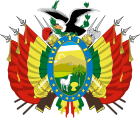1978 Bolivian general election
| |||||||||||||||||||||||||||||||||||||||||||
|
| |||||||||||||||||||||||||||||||||||||||||||
Presidential election | |||||||||||||||||||||||||||||||||||||||||||
| Turnout | 102.62%[a] | ||||||||||||||||||||||||||||||||||||||||||
|---|---|---|---|---|---|---|---|---|---|---|---|---|---|---|---|---|---|---|---|---|---|---|---|---|---|---|---|---|---|---|---|---|---|---|---|---|---|---|---|---|---|---|---|
| |||||||||||||||||||||||||||||||||||||||||||
| |||||||||||||||||||||||||||||||||||||||||||
 |
|---|
|
|
General elections were held in Bolivia on 9 July 1978.[3] The elections were the first held since 1966, with several military coups taking place during the late 1960s and early 1970s.[3] Although Juan Pereda of the Nationalist Union of the People won the presidential elections according to official statements, more votes were cast than there were registered voters.[4] After examining a number of allegations of fraud and other irregularities, the National Electoral Court decided to annul the results on 19 July.[5][6] The following day, Pereda was installed as President following a military coup. Pereda himself was overthrown by yet another military coup in November, which saw General David Padilla assume the presidency.[7] Fresh elections were held the following year, with Padilla transferring power to his democratically elected successor, Wálter Guevara.
Campaign
[edit]Several alliances were formed for the elections:[8]
Juan Pereda was supported in his presidential bid by both the Nationalist Union of the People and the Nationalist Revolutionary Movement of the People, whilst René Bernal Escalante was the candidate of both the PDC–PRB alliance and the Eastern Rural Party.[9]
Results
[edit]The official results were inconsistent; the reported total number of votes cast was 1,971,968, around 50,000 more than the number of registered voters (1,921,556), giving a turnout of 102.6%. However, the total of votes cast for each party and invalid votes was 1,990,671, nearly 20,000 higher than the reported total and representing a turnout of 103.6%.[9]
| Party | Presidential candidate | Votes | % | |
|---|---|---|---|---|
| Nationalist Union of the People | Juan Pereda | 986,140 | 50.90 | |
| Democratic and Popular Union | Hernán Siles Zuazo | 484,383 | 25.00 | |
| Democratic Alliance of National Revolution | Víctor Paz Estenssoro | 213,622 | 11.03 | |
| PDC–PRB | René Bernal Escalante | 167,131 | 8.63 | |
| Revolutionary Nationalist Movement of the People | Juan Pereda | 40,905 | 2.11 | |
| Revolutionary Left Front | Casiano Amurrio | 23,459 | 1.21 | |
| Indian Movement Túpac Katari | Luciano Tapia Quisbert | 12,207 | 0.63 | |
| Socialist Party | Marcelo Quiroga Santa Cruz | 8,323 | 0.43 | |
| Eastern Rural Party | René Bernal Escalante | 1,171 | 0.06 | |
| Total | 1,937,341 | 100.00 | ||
| Valid votes | 1,937,341 | 97.32 | ||
| Invalid/blank votes | 53,330 | 2.68 | ||
| Total votes | 1,971,968 | – | ||
| Registered voters/turnout | 1,921,556 | 102.62 | ||
| Source: Nohlen | ||||
Notes
[edit]- ^ The final tally established that more votes were cast than the total number of registered citizens.[1]
- ^ Coalition consisting of CUN, MPC, PL, PSC, PURS, UNB, and pro-military factions of the FSB, MNR, and PRA.[2]
- ^ Coalition consisting of more than 11 parties including MNRI, MIR, PCB, MPLN, VO, and PS-A.
- ^ On its ballot, the MNRP presented its leader, Jaime Arellano, as Pereda's running mate instead of Alfredo Franco Guachalla.
- ^ The MNRP presented Juan Pereda as their candidate on a separate ballot from the UNP, resulting in different vote totals. Pereda won 986,140 votes (50.90%) on the UNP ballot and 40,905 (2.11%) votes on the MNRP ballot.
- ^ Coalition consisting of MNR and PRA.
- ^ René Bernal Escalante did not accept this candidacy, but nonetheless received votes.
- ^ The PRO presented René Bernal Escalante as their candidate on a separate ballot from the PDC, resulting in different vote totals. Bernal won 167,131 votes (8.63%) on the PDC-PRB ballot and 1,171 votes (0.06%) on the PRO ballot.
References
[edit]- ^ Gisbert, Carlos D. Mesa (2003). Presidentes de Bolivia: entre urnas y fusiles : el poder ejecutivo, los ministros de estado (in Spanish). Editorial Gisbert. p. 159.
- ^ Nohlen, Dieter (14 April 2005). Elections in the Americas: A Data Handbook: Volume 2 South America. OUP Oxford. p. 150. ISBN 978-0-19-928358-3.
- ^ a b Nohlen 2005, p. 133.
- ^ Nohlen 2005, p. 143.
- ^ "Bolivia's Presidential Election Annulled— Court Responds to Fraud Charges, Orders New Vote". Los Angeles Times. AP. 20 July 1978. p. I-4.
LA PAZ, Bolivia (AP)— The National Election Court annulled Bolvia's July 9 presidential election Wednesday night and called for another vote within 180 days.
- ^ Morales, Waltraud Q (2003). A Brief History of Bolivia. New York: Facts On File. p. 195.
- ^ Nohlen 2005, p. 157.
- ^ Nohlen 2005, p. 139.
- ^ a b Nohlen 2005, p. 150.


